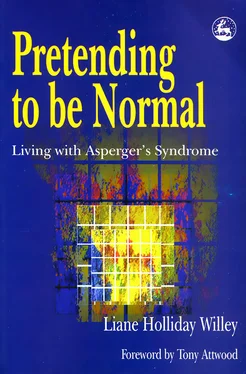Liane Holliday Willey - Pretending to be Normal
Здесь есть возможность читать онлайн «Liane Holliday Willey - Pretending to be Normal» весь текст электронной книги совершенно бесплатно (целиком полную версию без сокращений). В некоторых случаях можно слушать аудио, скачать через торрент в формате fb2 и присутствует краткое содержание. Город: London, Год выпуска: 2000, ISBN: 2000, Издательство: Jessika Kingsley Publishers, Жанр: Психология, Биографии и Мемуары, на английском языке. Описание произведения, (предисловие) а так же отзывы посетителей доступны на портале библиотеки ЛибКат.
- Название:Pretending to be Normal
- Автор:
- Издательство:Jessika Kingsley Publishers
- Жанр:
- Год:2000
- Город:London
- ISBN:1 85302 577 1
- Рейтинг книги:4 / 5. Голосов: 1
-
Избранное:Добавить в избранное
- Отзывы:
-
Ваша оценка:
- 80
- 1
- 2
- 3
- 4
- 5
Pretending to be Normal: краткое содержание, описание и аннотация
Предлагаем к чтению аннотацию, описание, краткое содержание или предисловие (зависит от того, что написал сам автор книги «Pretending to be Normal»). Если вы не нашли необходимую информацию о книге — напишите в комментариях, мы постараемся отыскать её.
Pretending to be Normal — читать онлайн бесплатно полную книгу (весь текст) целиком
Ниже представлен текст книги, разбитый по страницам. Система сохранения места последней прочитанной страницы, позволяет с удобством читать онлайн бесплатно книгу «Pretending to be Normal», без необходимости каждый раз заново искать на чём Вы остановились. Поставьте закладку, и сможете в любой момент перейти на страницу, на которой закончили чтение.
Интервал:
Закладка:
Old habits are hard to break and sometimes I notice myself echoing even though I work at home now and rarely feel compelled to fit in at all. Interestingly enough, I do not think anyone else realizes I am echoing, not even the people I am copying. Everyone that is, except for those who know me quite well. A few very observant friends have noticed an occasion or two when I had lost myself in the shadows of someone else, but no one has ever noticed as quickly or completely as my AS daughter does. She recognizes the moment I bend my voice or my motions to match someone else’s and it drives her to distraction. In no uncertain terms she will demand I stop acting like whomever, that I quit walking this way or that, that I stop pretending to be someone I am not. Though she does not yet fully understand the weight of her words, there is little that keeps me from comprehending the fact that she is right on track with her observation. Funny that she, another Aspie, is often able to see my pretence before I am.
I have come to the conclusion that even though I need to stop doing it, it is simply easier to echo, more comfortable and typically more successful superficially to pretend to be someone I am not. It is like putting myself on automatic pilot and free floating without lending a care to whether or not I am fitting in with the crowd. I must be if lam momentarily someone else. It’s a free ride until someone else notices. But it is a ride I have decided I need to get off. And with the help of my daughter and a few of my closest friends, I think I will, mostly because when I am with the people I really understand, the people whom I trust implicitly, I never have to take a free fall.
The people who have proven they will stand by me no matter what I say, think or do, have given me a finer gift than they will ever realize. They have given me the real gift of freedom that allows me to experiment with my development as I continue to refine and sharpen my instincts and actions. These are the friends that do not wince when I fracture a social rule. The people who offer immediate dispensation should I offend them with my words or actions. The colleagues who call me to offer their support before I have a chance to tell them I am falling apart. I am aware these are the kinds of acquaintances everyone treasures, but for AS people, they are much more. They are our barometers and our mirrors. By their actions we see how we are doing and in their eyes we can find who we are.
My two closest friends, Maureen, who has known me almost forever, and Margo, who found me during the last part of my most obvious AS years, help me to know what acceptable is, not just because they are always willing to offer instructions on how to act or advice on how to perceive things, but more important because they are so loyal in their affirmations that I am fine just the way I am. Through their eyes I am perfectly fine. Each of them dismisses my idiosyncratic ways with a smile and a wave of the arm, as if to say, You’re okay. Keep your head up. You can do this. They are confidence builders, confidants, cheerleaders, and advisors. They rein me in when I travel too far, they protect me from obvious blunders, and they applaud me when I stumble onto some part of me that is particularly worthwhile. But most important, most endearingly, they protect me, whether they realize it or not, from those who do not afford me so much grace.
They are quick to come to my defence, perhaps with just a word or a look, should someone begin to judge me for something I have said or done. And yet, they never condescend or patronize me. They simply illuminate that which is made better by my AS, my straightforwardness and assertiveness and creativity and tenacity and loyalty. Because they see me first as someone who possesses many good qualities, and only then as someone who is just a tiny bit different, they give me the notion to begin to see myself in that light as well. And though I cannot explain why this happens, their belief in me fosters my own belief in myself, which in turn helps me to become less apprehensive and more able. Maybe I just see myself as more able. Maybe I have just learned how to put my best foot forward in public. It does not matter what the reason, for the truth is, Maureen’s and Margo’s influence is substantial to my self-esteem, so important that when this invisible difference that is my walk with AS comes home to stay me, I am quickly comforted and buoyed by the fact that my friends will be there for me, no matter what, no matter where.
When I am with my closest friends, I can feel what it must be like to have a bunch of other friends, and for a moment I think I might just be over the old hang ups and anxieties. Sometimes, I will even try to do a really big friendship thing. I will host a lunch or show up at a function or even ask someone to go shopping with me. But, unless the person is extremely straightforward and blunt, I usually end up climbing back on stage, reciting the old lines and the old jokes, as my stomach starts to knot and my thoughts remind me how difficult this all is for me. I worry about this inability of mine, not so much because of how it affects me, but more because of how I think it might affect my children or the people whom I do not seem to grow close to. I do not want my children to grow up thinking they need to be loners, just because I am. I do not want the kids to be embarrassed because their mom would rather stay at home than join other moms for coffee or a girls’ night out. And I do not want the people whom I meet to get offended if I turn down their invitations or never offer one on my own. I wish people could understand that I can soak up all I need from most friends in just a few minutes, then walk away happy and content, knowing I have just spent time with a friend. I am not trying to be at all evasive or unfriendly, I just fill up fast.
I like the friends I have, the few-minutes-a-day kind and the going-out-to-lunch-together kind. But I think it is important to acknowledge that there are many AS people who might never develop close friendships, even when they have learned how to be less egocentric, how to read nonverbal messages, how to express their wants and needs at the appropriate times and in the appropriate manner, and how to appreciate the nuances of proper friendship etiquette like secret keeping and personal space boundaries. I simply mean to say that truly close friendships are often very difficult to find, no matter who you are, and if I were counseling someone with AS, I think I would be very honest and objective about that possibility. I would try to explain that sometimes, no matter what we do and no matter how wonderful we might be, things happen to interfere with friendships. I would lead them, for example, through elaborated stories that illustrate people moving to far away towns, people getting wrapped up in their busy schedules, following different routines, having different interests, enjoying different kinds of play, and having their own set of difficulties and responsibilities. I would try to explain that sometimes time and place and sets of circumstances all work against real friendships. If this kind of open honesty is not a part of the total social skills counseling, I worry that an AS person’s literal minded thinking might lead them to believe in a magic friendship equation that says being nice + sharing toys + keeping secrets — friends and invitations to parties. I worry, what will happen if the equation does not work out?
If it were me, I would want to make it very clear that life can be great with or without a large group of friends, but I would still try to help the AS person to understand that friendships come in turns out differently, strong and enduring. I think I would try to help them look for friendship circles that would be most likely to include people they would enjoy. People who share the same interests, ideas, morals, beliefs and general lifestyles. I would encourage them to join special interest clubs. I would advise them to cultivate a few moments with people they see in their neighborhood, at work, at school or on the regular routines. I might suggest they find a four legged friend to keep them company, not just for the therapy animals can provide, but also because pets can often bring out the best in all kinds of people and because they can bring strangers together. It is my opinion that with good and honest social skills training and follow-through counseling that works to help the AS person find appropriate social circles, all AS people can find friends. The question I cannot answer is, will they?
Читать дальшеИнтервал:
Закладка:
Похожие книги на «Pretending to be Normal»
Представляем Вашему вниманию похожие книги на «Pretending to be Normal» списком для выбора. Мы отобрали схожую по названию и смыслу литературу в надежде предоставить читателям больше вариантов отыскать новые, интересные, ещё непрочитанные произведения.
Обсуждение, отзывы о книге «Pretending to be Normal» и просто собственные мнения читателей. Оставьте ваши комментарии, напишите, что Вы думаете о произведении, его смысле или главных героях. Укажите что конкретно понравилось, а что нет, и почему Вы так считаете.












